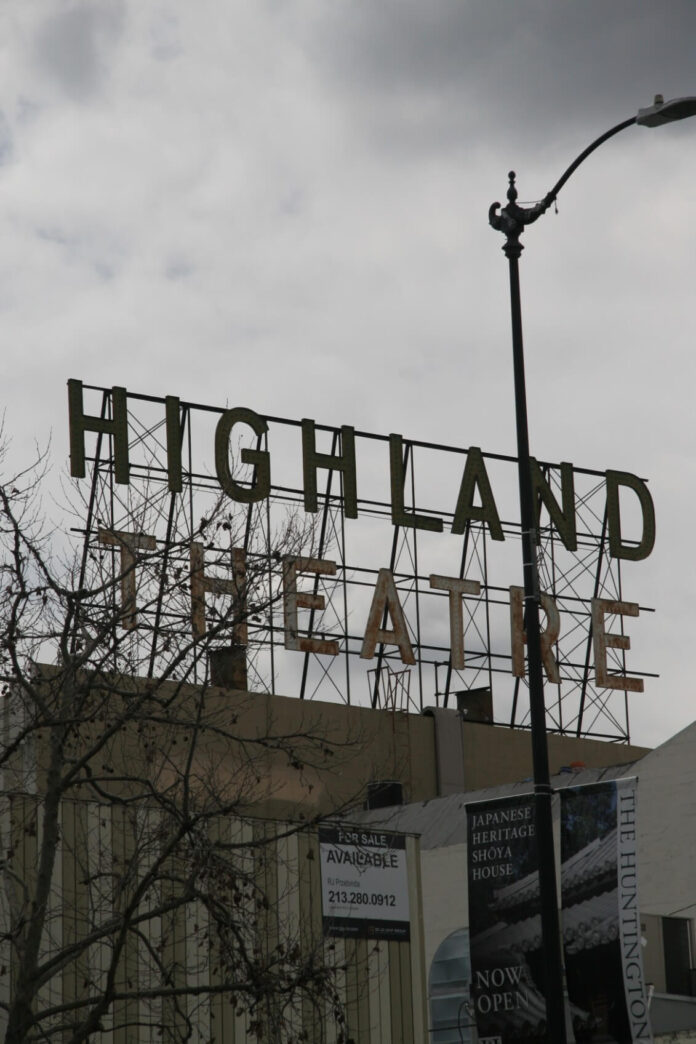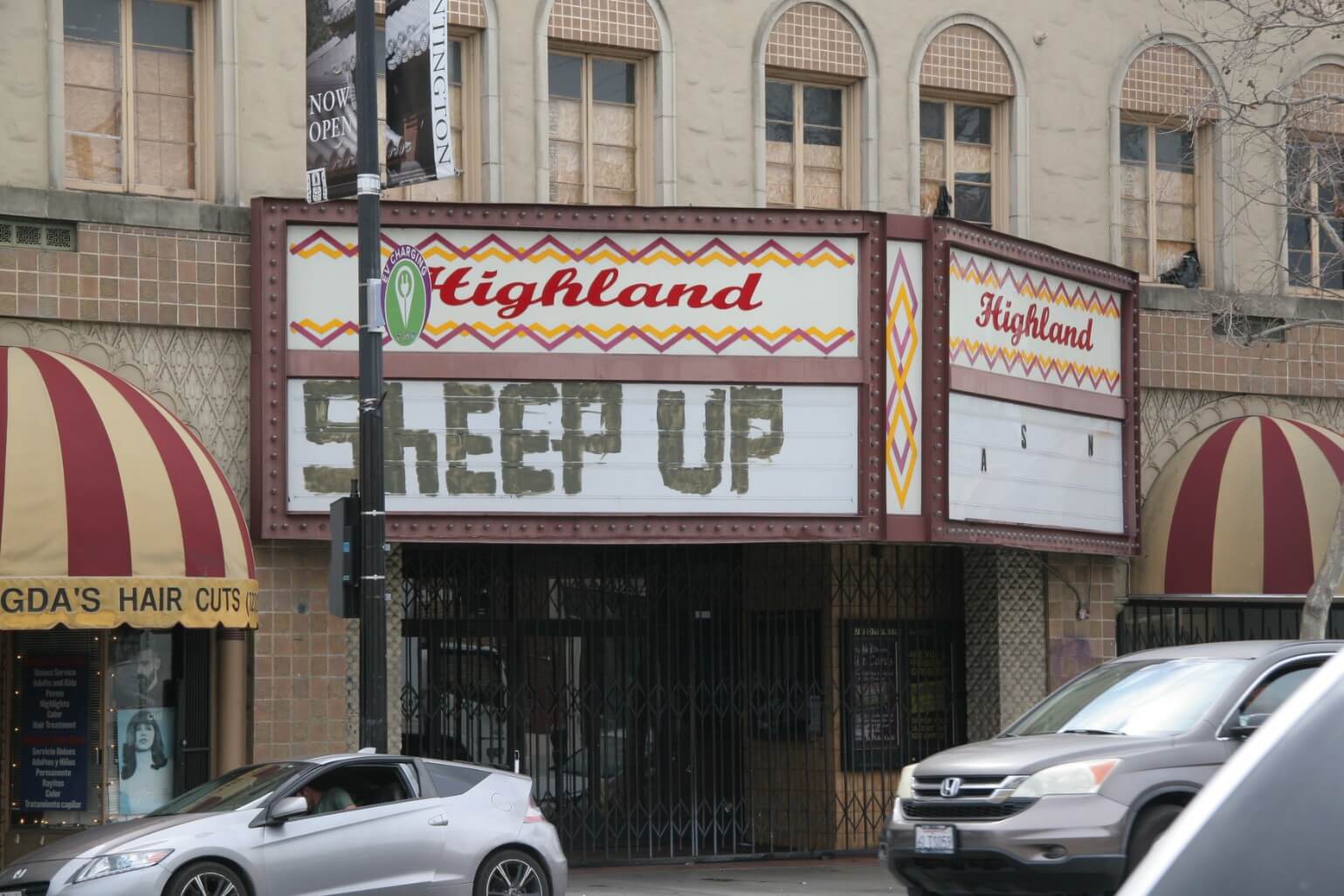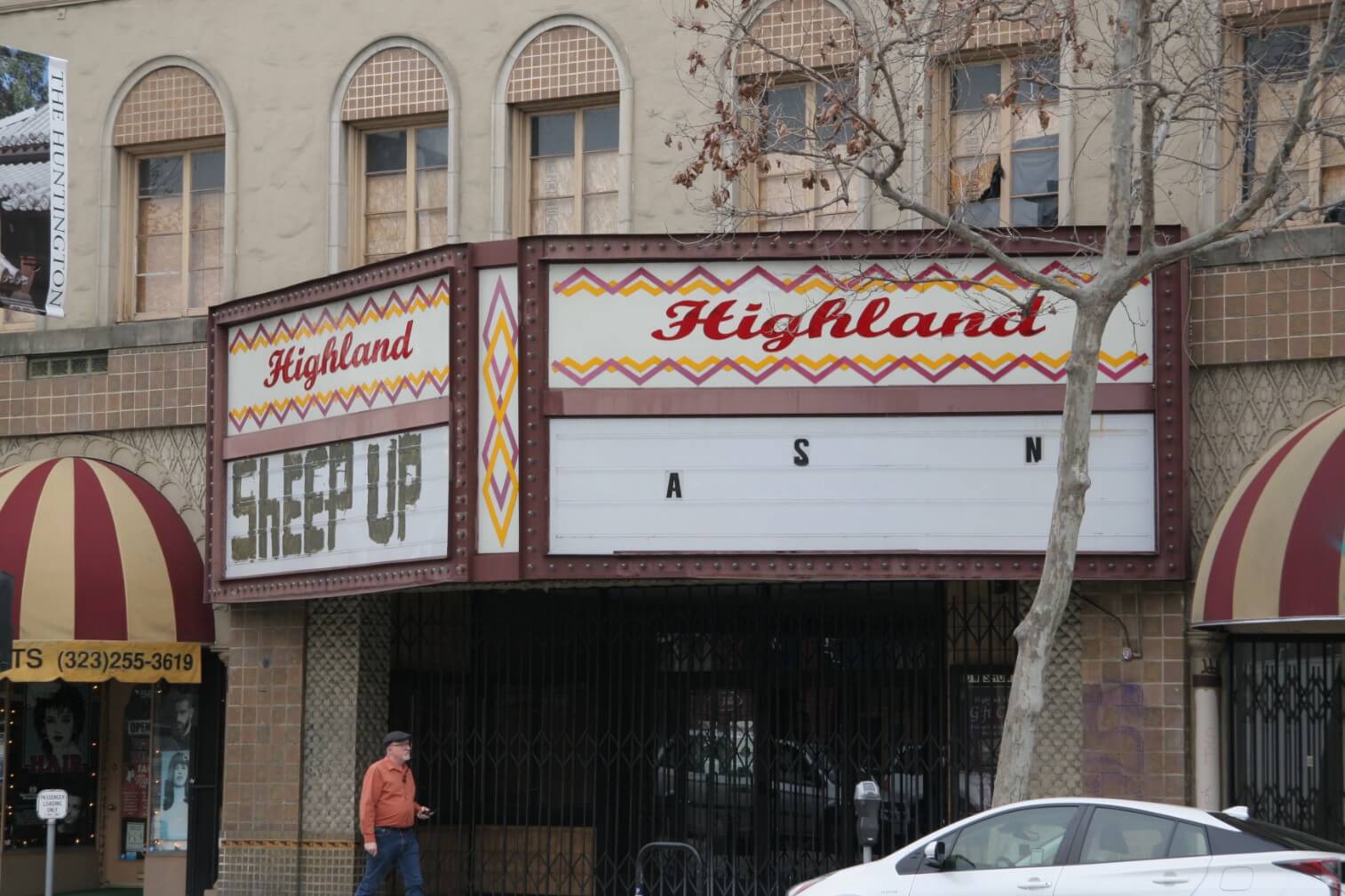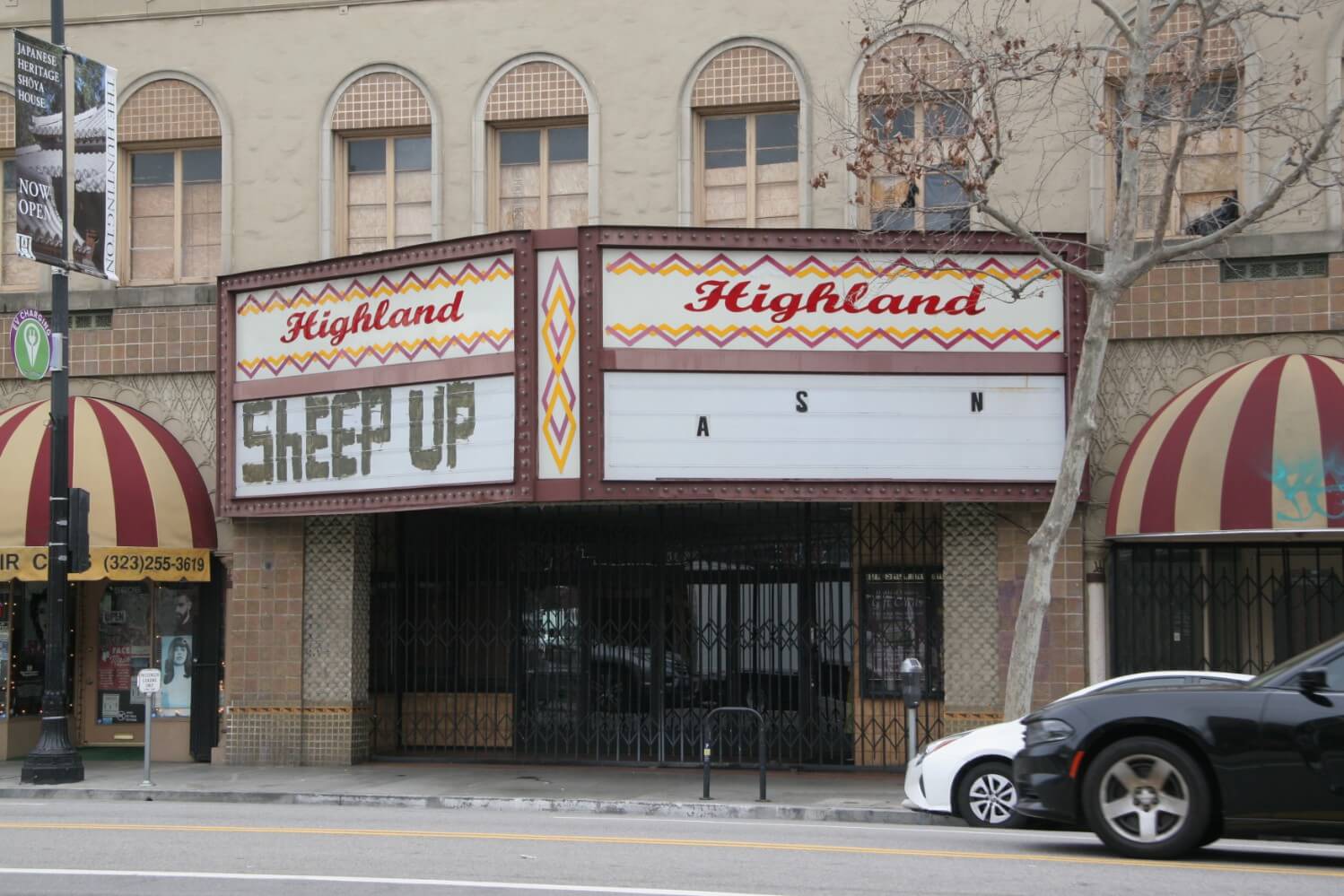
Feb. 29, five days before its 99th anniversary, the Highland Theatre closed its doors indefinitely. Since then, graffiti has appeared on the theater’s marquee, and the lobby has remained dim behind drawn gates.
Ralph Waxman, president of the Arroyo Arts Collective, said the closure was an inevitable result of the theater’s recent financial troubles, which were worsened by the pandemic.
“[The theater] didn’t really have a choice,” Waxman said. “It wasn’t making money. Post-COVID, they were never back to what they were, and it was too expensive of a property to operate like that.”
Still, Waxman said the theater’s convenient location, affordability and family-friendly environment made it a community cornerstone.
“It was the last place where you could experience an art form like film without having to go to downtown or Pasadena, and it was certainly affordable for residents who can’t afford to take their family to a $20 movie,” Waxman said. “It was an integral part of the community.”

According to Waxman, theaters are essential to any community, as they provide residents with the comforting escape of cinema.
“You need a drugstore, you need doctors, you need laundromats and you need theaters,” Waxman said. “Because people around the country and around the world [want] to escape for two hours and go to a magical fantasy world.”
Marita De La Torre, executive director and co-founder of the Highland Park Independent Film Festival, said the Highland Theatre was especially necessary to Highland Park, as it had become more than just a theater. She said the theater, located centrally in the neighborhood, held symbolic value for Highland Park as a reflection of the community’s progress.
“As Highland Park goes, so does the theater.” De La Torre said. “It’s always reflected what has gone on. The changes of the community [were] something that the theater had to absorb as an iconic thing in the heart of Highland Park.”
De La Torre also said the theater helped shape Highland Park’s identity by promoting its arts and business industries.
“The arts and the businesses have always been the two driving forces of the community, and the Highland Theatre has been at the forefront of any artistic endeavor,” De La Torre said.

According to De La Torre, the 99-year history of the Highland Theatre was one of resilience, christened with good fortune by a renowned actress during its opening in 1925.
“In those 99 years, this theater is the last one of 12 that were up and down the area,” De La Torre said. “The illustrious Norma Shearer cracked a bottle of champagne on the side of the theater to wish it good luck. It turned out to be really good luck because 99 years later, it remains.”
De La Torre said that throughout this history, the theater saw many moments of heartwarming community congregation, especially when the theater hosted the annual Highland Park Independent Film Festival (HPIFF). She said one of those moments helped the community reconcile with its history of gangs.
“Our first feature film that won the award for best feature was about a gang member,” De La Torre said. “We were told not to screen it. There were people on the streets saying, ‘You’re going to start a gang war.’ At the end of that screening, everyone was in tears. Full-grown men, ex-gang members, stood up, applauded.”
Another one of those moments, De La Torre said, involved an aspiring director who built her career at the Highland Theatre through the HPIFF.
“We had a woman who did a short film, then came back with another,” De La Torre said. “Then she volunteered. The next year, she was a judge. Then, this last year, she showed her first feature film and won best feature.”
Tyrrell Shaffner, the aspiring director, said the theater served as a gathering space for the Highland Park film community.
“It’s one of the core aspects that makes Highland Park such a vibrant home for the arts,” Shaffner said.
According to De La Torre, the theater even functioned as a daycare of sorts.
“Community members have said, ‘this theater was my babysitter,’” De La Torre said. “Saying, ‘We used to get dropped off here.’”
Waxman said that when he first visited the theater with his then-girlfriend, the theater’s floor was unusually damp. However, he said this oddity gave the theater an authentic charm.
“It was squishy,” Waxman said. “It must have been after one of the floodings. Sometime after, they did a [refurbishment]. The floor was fixed. But I thought, ‘You’re not going to get a swampy theater going to the AMC megaplex. You’ve got to keep it real.”
According to Waxman, the theater’s interior also retained many features of the ritzy, Art Deco-esque architecture of the 1920s, as it was also built for live theater.
“There’s a proscenium stage and balcony,” Waxman said. “And there are still panels in the proscenium, in the fly system, from old vaudeville and burlesque shows.”
Echoing Waxman, De La Torre said that the architectural features of the theater serve as a testament to its enduring history.
“It’s remarkable how some of the carpeting from 1925 is still there,” De La Torre said. “Some of the frescoes — it’s remarkable. So many things from 1925 have survived.”
Mando Medina, a Highland Park community activist, said he remembers the theater as a place to have a good time with friends and family.
“You just felt a sense of community,” Medina said. “Everybody’s happy to see the movie, and they’re eating their hotdogs, their popcorn. You only paid four bucks; you got a hot dog for two.”
Medina said the perpetually grumpy theater owners added a unique sense of familiarity to the place.
“It was funny because they were always mad,” Medina said. “But they didn’t make me feel uncomfortable. They never ruined the experience. They only added to it.”
For him and his friends, Medina said the theater holds many memories of playful childhood delinquency.
“As a kid, all my friends would go there, go to the top floor and throw popcorn down,” Medina said. “[We’d] buy a ticket for one and jump to the next one for free.”
According to Medina, the theater was also a safe haven from gang violence, an issue in Highland Park during the 80s and 90s.
“People respected that it was theater,” Medina said. “Because there was families there, there was kids. People knew not to mess around in there.”
Medina said the theater’s closure now seems like the finishing blow to the community in its fight against gentrification.

“It’s the last historic landmark that we have,” Medina said. “It feels like the last straw.”
According to Waxman, the building’s new owner, investor Cyrus Etemad, plans to keep the space a theater and performance venue for the community.
“What I read says the owner’s intent was to buy it and keep it as a theater, restore it, and then reopen it,” Waxman said. “Primarily for film and music.”
De La Torre said she has heard the same as Waxman on the new plans for the building.
However, Medina said he is skeptical that Etemad will follow through, as the theater industry continues to do poorly. He said he anticipates the building will be turned into an upscale music venue, much like the Lodge Room, a music venue across the street.
“You’re going to tell me, as an investor, that you’re going to turn this into a movie theater, after you know the movie industry is tanking?” Medina said. “In my opinion, he’s going to turn it into a high-class music venue, where he could profit.”
Should this occur, Medina said Highland Park will be stripped of an important community gathering space.
“It’s not for the community,” Medina said. “We’re not going to be able to afford that.”
Jamie Tijerina, president of the Highland Park Heritage Trust, said she believes Etemad should attempt to survey community sentiment on the theater, which supports an affordable, community-oriented theater.
“It would be good for the owner to hold a meeting or do comprehensive surveys,” Tijerina said. “Many people have voiced that they do want it to remain a movie theater.”
Waxman said that turning the theater into anything else would be disrespectful to the community.
“It would be a real slap in the face,” Waxman said.
Shaffner said the theater was essential to the community’s lifeblood.
“When I heard the news that the theater was closing, I knew that my neighborhood may be losing its beating heart,” Shaffner said.
According to De La Torre, the establishment of the Highland Theatre has been defined by its perseverance and elegance.
“Lord knows the building has done its part, standing through so many years,” De La Torre said. “The legacy is of a tough, old, but grand building. That building has been defined by grit and grace.”
Like Medina, Waxman and Shaffner, De La Torre said it feels imperative to the community that the Highland Theatre remain a theater.
“It would be heartbreaking,” De La Torre said. “It would be a travesty if it does not remain a theater for the rest of its years.”
Contact Noah Kim at nkim4@oxy.edu
This article was updated at March 21, 12:47 p.m. to reflect that Waxman said that the theater, not the Arroyo Arts Collective, had to close itself and that the property was too expensive, not the theater’s prices.
![]()






























